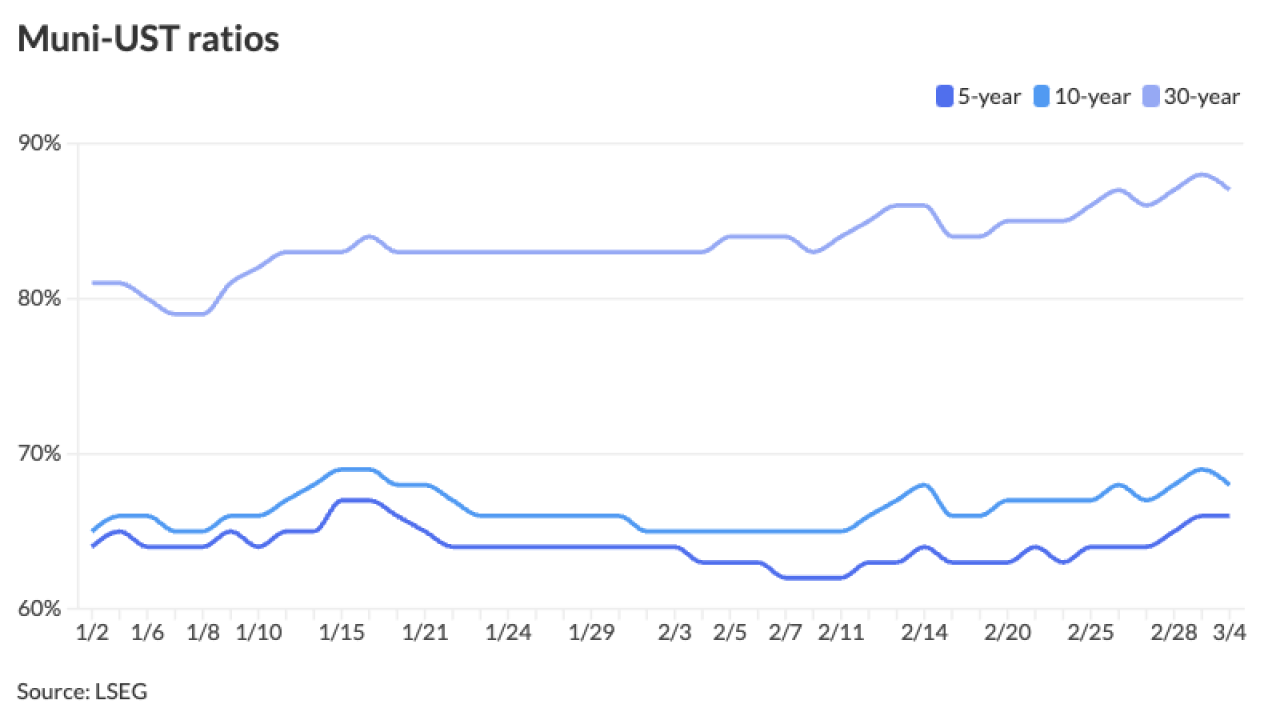Jessica Lerner is a senior reporter and buy-side specialist for Bond Buyer where she writes the daily market column, the monthly volume story and longer trend stories. Prior to this, she worked as a beat reporter at two Connecticut newspapers. She earned her master's in business and economics reporting from the Craig Newmark Graduate School of Journalism and her bachelor's in journalism and statistics from the University of Connecticut.
-
"The ever-shifting narrative regarding President Trump's tariff policies is throwing fuel on the fire of unpredictability," said SWBC's Chris Brigati.
March 11 -
The market rally "took a bit of a breather last week, with yields rising across the curve," said Daryl Clements, a portfolio manager at AllianceBernstein.
March 10 -
"March is not an overly positive month for munis, but a lot will depend on U.S. Treasuries," said Barclays strategist Mikhail Foux.
March 7 -
"Markets fixate on one risk at a time, and there's no shortage right now. Volatility has spiked, liquidity is thin, and buyers are sidelined — but that's temporary," said James Pruskowski, chief investment officer at 16Rock Asset Management.
March 6 -
Investors like the 10-year area of the curve because "if they're buying duration, the tax-exempt market is usually going to be one of the best places to buy," said Wesly Pate, a senior portfolio manager at Income Research + Management.
March 6 -
Issuance remains heavy this week, but while it's elevated, the muni market is "structurally undersupplied," meaning if 2024's record level of $500 billion-plus of issuance was doubled, the market could still digest it quite well, said Wesly Pate, a senior portfolio manager at Income Research + Management.
March 5 -
Short-end U.S. Treasuries rallied mid-morning, while UST yields were little changed out long, but ended the day weaker across most of the curve with the greatest losses out long. Munis were steady throughout the day.
March 4 -
"Apathy and caution" were the theme of the past week, said Birch Creek strategists.
March 3 -
New York City leads the negotiated calendar with $1.4 billion of GOs, followed by the Regents of the University of California with $1.2 billion of general revenue bonds.
February 28 -
February's volume was at $33.725 billion in 622 issues, up 1.6% from $33.191 billion in 614 issues in February 2024, according to LSEG data.
February 28 -
While UST yields rose up to five basis points out long Thursday, the current rally "that has taken the 30-year UST closer to where the 10-year yield traded a week ago has not impacted the same range in munis," said Kim Olsan, senior fixed income portfolio manager at NewSquare.
February 27 -
It has been a bit of a "heavy start" to the year for issuance, said Jeff Devine, a municipal research analyst at GW&K.
February 26 -
Muni prices continue to "show relative resilience" despite a nearly record pace of issuance, said Matt Fabian, a partner at Municipal Market Analytics.
February 25 -
The public finance industry is addressing cyber threats, which became clearer with last year's hack of White Lake Township's bond closing.
February 25 -
Last week, "there was no meaningful economic data to digest and yields were slightly lower," said Daryl Clements, a portfolio manager at AllianceBernstein.
February 24 -
The muni market produced $512.7 billion of debt issuance in 2024, up 33.1% from $385.1 billion in 2023, according to LSEG data. This surpasses the previous record of $484.6 billion in 2020 by almost $30 billion.
February 24 -
In total, municipal bond insurers wrapped $41.09 billion of debt in 2024, an increase from the $35.38 billion insured in 2023, according to LSEG data.
February 24 -
Market activity has been somewhat "subdued," and USTs yields have been "relatively well-behaved," though the 10- to 30-year rates have slightly underperformed, moving up three to five basis points, said Barclays strategist Mikhail Foux.
February 21 -
Investors added $546.3 million to municipal bond mutual funds in the week ending Wednesday, following $238.5 million of inflows the prior week, according to LSEG Lipper data.
February 20 -
The Investment Company Institute reported outflows of $336 million for the week ending Feb. 12, following $852 million of inflows the previous week.
February 19




















